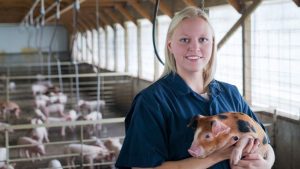Duke Energy has finalized a deal to purchase captured methane gas derived from swine waste. The project will take place at farms located in Kenansville, North Carolina and its the second waste-to-energy project of its kind for Duke Energy. The captured methane will be treated, injected into a pipeline system and then used to produce renewable electricity at two power stations: H.F. Lee Station Combined Cycle Plant in Wayne County, N.C. and Sutton Combine Cycle Plant in New Hanover County, N.C. The project should be operational by summer of 2017.
 “We see continued advancement in this technology in North Carolina,” said David Fountain, Duke Energy’s North Carolina president. “This project has environmental benefits and is cost-effective for our customers.”
“We see continued advancement in this technology in North Carolina,” said David Fountain, Duke Energy’s North Carolina president. “This project has environmental benefits and is cost-effective for our customers.”
The location is in the heart of Smithfield Foods’ pork operations. Duke Energy says the power produced will be carbon neutral as compared to the emissions that would result if the waste was left to decay using current methods.
Under North Carolina’s Renewable Energy Portfolio Standard (REPS), Duke Energy companies must meet specific compliance targets for swine and poultry waste. In March, the company announced a project with Carbon Cycle Energy to use swine waste-derived gas at four power plants in North Carolina. With this project, the Optima KV digesters will produce about 80,000 MMBtus captured methane a year that will create about 11,000 megawatt-hours of renewable energy annually. The renewable energy credits (RECs) generated annually by the effort will help satisfy state mandates and Duke Energy has filed to have both power plants designated as new renewable energy facilities.

